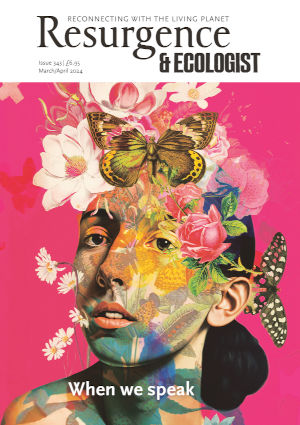Three formative visits to the wilderness of the Canadian Subarctic alert Li An Phoa to the global urgency of river ecology degradation. On her first visit, she joins a canoe protest against a proposed hydroelectric project within the territory of the Indigenous Cree people. Their Rupert River is undammed, truly wild, and drinkable. As a European reader, I am transported to a fluvial world that feels as if it is on the precipice of unbeing. Phoa’s Cree companions impart a perspective that will come to shape her worldview – best summarised by their word for all living beings, regardless of species, eeyou.
Following in the tradition of philosopher-wanderers like Kierkegaard and Aristotle, she embarks on walking studies across the globe. From the Sámi lands of northern Sweden, via the temperate rainforest of Dartmoor, to the Pacific Crest Trail in the US, Phoa journeys on foot while contemplating what Richard Louv termed “Nature-deficit disorder” – the disconnectedness of much of human civilisation from the nourishing web of life.
Phoa’s prose subtly mimics the meandering quality of thought one has on a walking journey, so much so that I’m urged out on a walk of my own. Dichotomies abound in her thoughts, whether between Indigenous wisdom and the scientific tradition, her academic curiosity about both business studies and philosophy, or theory around the dominance of the human brain’s ‘rational’ left over the undervalued, creative right. These silos of separated thought, she argues, may be to blame for the ecological damage she encounters. Instead, she asks: “What can an arborist and lung specialist learn from each other?”
As I wander the banks of my own heavily polluted local river, the wounds of the Nature–society disconnect manifest increasingly in Phoa’s words. A colossal aqueduct displacing water from its ecosystem of origin into the residential sprawl of Los Angeles. A Belgian brewery depleting local groundwater to produce vast volumes of beer for export. Most painful of all, the Canadian Rupert polluted beyond drinkability, devastating local bird populations and forcing the Cree to abandon their ways. Phoa’s travelogues bring to mind the visual narrative of the 1982 documentary Koyaanisqatsi, in which the stubborn advancement of humankind – be it dizzying timelapses of traffic or the upward plumes of atomic bomb tests – is set in juxtaposition to a landscape wounded and drained. But Phoa is careful not to dwell in doom.
If a culture of fragmented thought is to blame for the ecological state of the world, it is in the liminal spaces Phoa encounters that meaning flourishes. She considers the boundary at which a raindrop falling from the sky will join the Dart or Torridge river basins, the space in which the Mojave Desert morphs into the Sierra Nevada mountains, the number at which individual starlings become a unified murmuration. Her walking journeys and accompanying musings – from deep ecology to neuroscience to poetry to economics – become a pursuit of reconnection and, ultimately, hope. Through a blend of travelogue and autobiography reminiscent of Suzanne Simard’s Finding the Mother Tree, Phoa also shares her own self-evolution from forgotten roots and fragmentation to a broader identity shaped by the landscapes and literature she explores.
It is during her third visit to the Rupert, and on witnessing not only the pollution of the river but the societal damage to the Cree, that Phoa pledges to dedicate her life to the (re)attainment of drinkable rivers. Returning home, she walks the length of the river Meuse, flowing through France, Belgium and the Netherlands, to raise awareness of her manifesto.
In recent years, dozens of campaigns have emerged in the UK seeking safer concentrations of pollution in our fresh water and coastal waters, so that humans might swim outdoors without contracting gastrointestinal illnesses. I lead such a campaign for the Bristol Avon. Reading Phoa’s remarkable book, I realise this is only, as she would put it, “a nice interim step”. Why shouldn’t our rivers be drinkable?
Drinkable Rivers: How the River Became My Teacher by Li An Phoa with Maarten van der Schaaf. Drinkable Rivers, 2023. ISBN: 9045049317.







